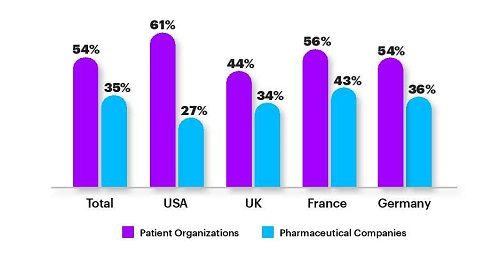Article
More pharma collaboration with patient organizations would improve patient care, says Accenture
New study finds a growing reliance on patient organizations for improving the patient journey
“Patient centricity” is the current theme of most pharma companies; however, both now and increasingly in the future, patients will go first to patient organizations rather than pharma for information, financial and emotional support. That’s the overall theme of this year’s Accenture study on patient services, “Better Together: Why pharma companies and patient organizations need to collaborate.” The study has been updated annually (see here for 2017’s report); this year, Accenture polled 4,000 patients in France, Germany, UK and the US with one of three specific conditions — migraine, rheumatoid arthritis and chronic lymphocytic leukemia.
Broadly speaking, pharma comes last in patient preference when relying on physicians, patient organizations, pharmacies, or health insurers for information and support in the patient journey. Pharma is next to last (ahead of pharmacies) even when the topic is obtaining information on clinical trials and therapies.
[caption id="attachment_8568" align="alignright" width="500"]

Accenture asked, "Do you think your engagement will change [i.e., increase] over the next two years?" for patient organizations or pharma[/caption]When asked “How do you think your engagement … will change over the next two years?” 61% of US patients indicated that involvement with patient organizations will increase; only 27% of them indicated pharma companies (see figure). It’s also worth noting that across the countries surveyed, US patients had the lowest regard for pharma’s support.
On the flip side, 84% of patients indicated that patient organizations should work more closely with pharma “to create a seamless patient experience”—indicating a potential opportunity for pharma to get closer to the patient experience. “Our research revealed that people are engaging early and often with patient organizations — much earlier and more often than they do with pharma, stated Keena Patel, a managing director in Accenture’s Life Sciences practice. “Collaborating with one another could enable a much richer understanding of patient needs, earlier in the care process and potentially lead to creating entirely new services that dramatically increase the standard of care, particularly in the US.”
Over the past several years, Pharmaceutical Commerce has tracked the growth of outsourced hub services providers, financed by the pharma industry, to support patients; pharma companies themselves also are engaged. How closely the support is perceived to be coming from the pharma company, when an outsourced provider is used, is an open question. Earlier Accenture studies showed that neither patients nor physicians were well informed about the availability of this support.
Newsletter
Stay ahead in the life sciences industry with Pharmaceutical Commerce, the latest news, trends, and strategies in drug distribution, commercialization, and market access.





